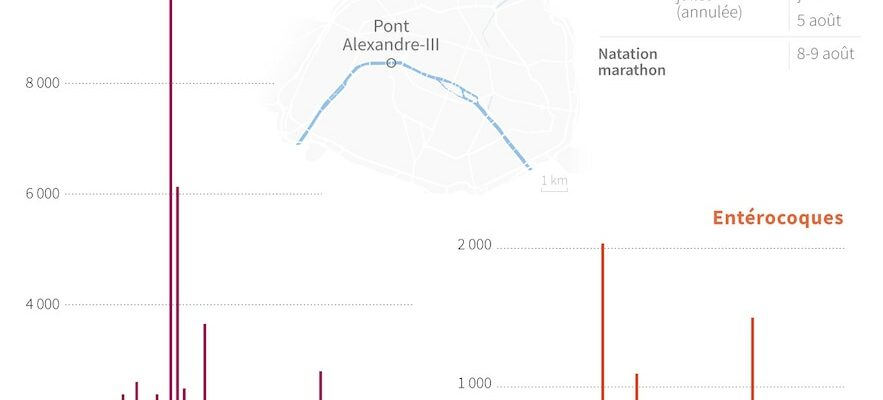The men’s triathlon event at the Paris 2024 Olympic Games has been postponed from Tuesday to Wednesday for “health reasons”, due to water in the Seine still being too polluted, the organizers announced three hours before the start.
The triathlon is the first Olympic discipline to be held in the river, before the open water swimming in the second week of the Paris Olympics. Heavy rains on Friday and Saturday in Paris have degraded the quality of the water, with the latest analyses showing “values recorded at certain points along the swimming course” that are “still above acceptable limits”, World Triathlon and the organising committee announced in a joint statement on Tuesday morning.
The two “familiarization” training sessions in the Seine scheduled for Sunday and Monday had already been canceled due to pollution. But on Monday morning, the organizers said they were still “confident” for Tuesday. The men’s event has been rescheduled for Wednesday at 10:45 a.m. (8:45 a.m. GMT), after the women’s event at 8 a.m. (6 a.m. GMT), “provided that the next tests meet the swimmability threshold standards,” they said.
Possible postponement until Friday
If the quality of the Seine is still insufficient, a new postponement would be possible on Friday, another “contingency day”, specify the organizers, whose “priority is the health of the athletes”. However, Météo France predicts storms causing rain for several hours on Tuesday evening, which could again degrade the quality of the water in the middle of the week.
The men’s triathlon event scheduled for Tuesday, July 30, 2024 has been postponed to Wednesday for “health reasons.”
© / Valentina BRESCHI, Sabrina BLANCHARD / AFP
On Sunday, the prefecture stressed that the amount of rain that fell, “15 to 20 mm on Friday and 10 mm more on Saturday”, represented “the equivalent of about 15 days of precipitation in a normal month of July”. In the event of heavy rainfall, untreated water can be discharged into the river, a phenomenon that the retention structures inaugurated just before the Games are intended to prevent. The sun has returned since Sunday morning in the capital where scorching temperatures were expected on Tuesday.
The organizers, who did not specify the levels of E.Coli and enterococci bacteria, the two taken into account to authorize or not swimming in a natural environment, emphasize an “improvement in the quality of the water over the last few hours.”
However, this was not enough to launch the first event on D-Day. A first major hiccup for the organizers, while other events were looming in the Seine: the mixed triathlon relay on August 5, then the marathon swimming (August 8 and 9) and paratriathlon (September 1 and 2).
Part of the “inheritance”
This is not the first postponement of these Games due to bad weather, to which the opening ceremony had to adapt on Friday: the men’s street skateboarding events, initially scheduled for Saturday at Place de la Concorde, had to be postponed until Monday.
But the events in the Seine have been giving the organizers cold sweats for months. In August 2023, part of the rehearsals for the Olympic events planned in the river, the test events, had to be canceled due to insufficient water quality. The State and the Paris region’s local authorities have invested 1.4 billion euros to make the Seine and its main tributary, the Marne, swimmable for the Olympic Games and then for the general public. This decontamination is an important part of the vaunted “legacy” of the Olympic event. In particular, Paris City Hall has built, for a final budget of around 100 million euros, a gigantic retention basin that can receive up to 50,000 m3 of wastewater and rainwater from the capital in the event of heavy rain. “It is because there are all these investments that the situation is being restored very quickly,” assured Paris Mayor Anne Hidalgo on Monday.
Due to heavy rains, the water in the Seine had been of poor quality for much of June, making it unsuitable for swimming. However, water quality analyses were recently within health standards six days out of seven from July 17 to 23.
On July 17, after a postponement partly due to bad weather, Anne Hidalgo, who promised Parisians that they would be able to swim in the river next summer, and the president of the organizing committee Tony Estanguet went swimming to set an example. The results of the water analyses known after the fact showed that on that day, the level of fecal bacteria E.Coli was close to the threshold of international federations for competitions, but exceeded that of swimming for the general public.
